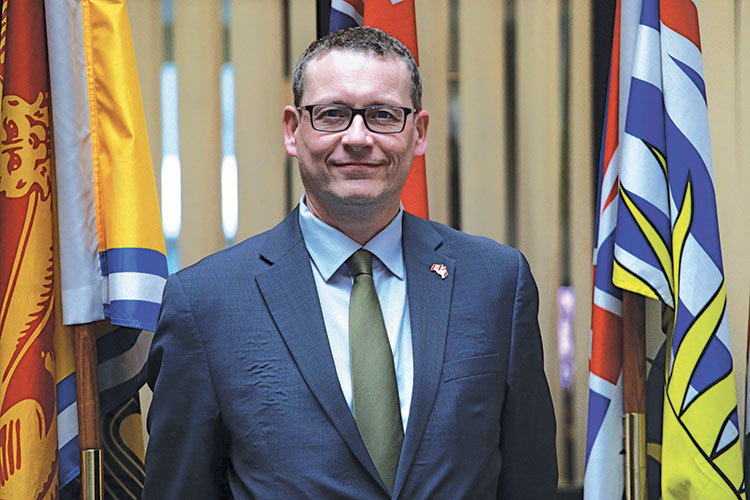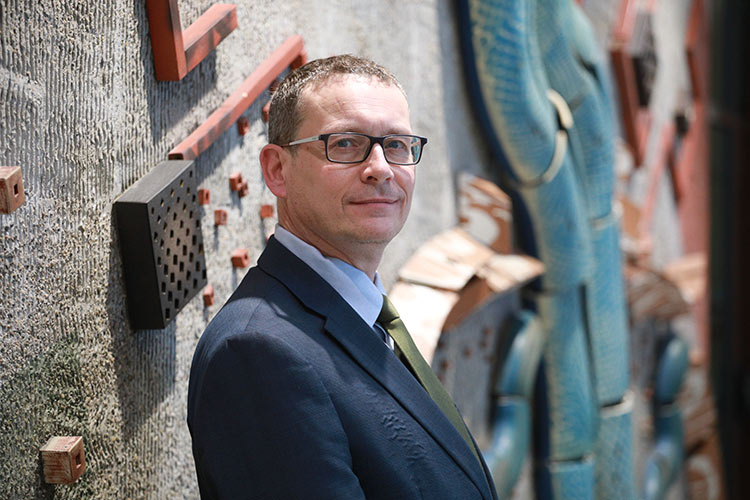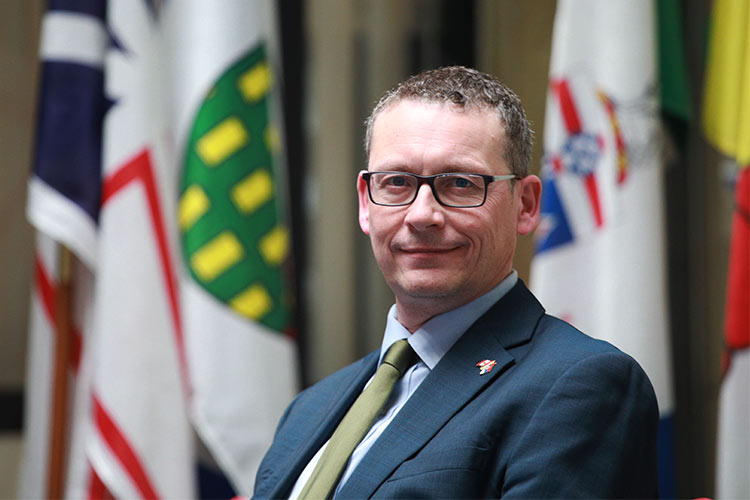We are today enjoying positive bilateral relations that have the potential to expand and grow stronger. Relations between Serbia and Canada are multifaceted. Canada’s priorities in Serbia include increased bilateral commercial and economic cooperation ~ Giles Norman
The year marking the 80th anniversary of the establishing of diplomatic relations between Serbia and Canada is also marked by bilateral trade surpassing CAD100 million for the first time in the last decade, says ambassador Giles Norman in this interview for CorD Magazine, adding that “this shows that companies from Canada and Serbia have developed strong mutual ties and recognised our two markets as being very important for their businesses”.
In view of their long tradition in the mining sector, Canadian companies are also mentioned as possible investors in this field in Serbia, which offers great growth potential, but is also causing great concern for the environment among citizens. As Ambassador Norman explains, “a key component of the ‘Canada Brand’ in the mining industry is corporate social responsibility and the voluntary actions of companies that serve to integrate social, environmental and economic considerations into their activities”.
Your Excellency, how would you summarise the experience of your first few months in the region? What do you consider as the biggest challenges in Serbia, Montenegro and North Macedonia?
My overall experience is very positive. I witnessed for myself the famous Serbian hospitality, especially outside Belgrade, and have visited some interesting places since my arrival last December. I have visited Montenegro and North Macedonia and will visit both of them more frequently in the coming months. The region is fascinating; a meeting place of cultures and perspectives, with a rich history and culture. Challenges lay in building sustainable futures for all three countries that will attract investment and respond to the demographic challenges that all three countries are facing, and which will have profound socioeconomic effects.
Your tenure in Serbia began during a year that marks the 80th anniversary of the establishing of diplomatic relations between the two countries. How would you characterise those relations today?
Yes, this year we marked the 80th anniversary of establishing Belgrade-Ottawa relations, and I am certainly glad to start my diplomatic mission here by celebrating this jubilee. To commemorate the anniversary of 30th May 1941, when a royal decree launched diplomatic relations between the two capitals, the Embassy, in cooperation with the Archives of Yugoslavia and the Ministry of Foreign Affairs of Serbia, organised an exhibition on the premises of the Archive in Belgrade. This was the beginning of our formal, diplomatic relations, which blossomed rapidly. We today enjoy positive bilateral relations that have the potential to expand and grow stronger. Relations between Serbia and Canada are multifaceted. Canada’s priorities in Serbia include increased bilateral commercial and economic cooperation. In addition, we have much to learn from each other about how our respective countries recognise, accommodate, support and treasure diversity.

Diversity is a national resource, and inclusion makes us stronger, as the Serbian diaspora in Canada has proven. There are many examples of our cooperation, such as Canada’s support for Serbia’s successful candidacy to be re-elected to the UNESCO Executive Board for the 2019-2023 term. We have vibrant cooperation in the arts, literature and culture, including the participation of Canadian dance theatre, visual art exhibitions, film and music at local festivals. There are over 300 Canadian book titles that have been translated into Serbian. We also have a modest Canada Fund for Local Initiatives, which we use to support civil society and NGOs, focusing on inclusive governance, peace and security, the environment and gender equality.
To commemorate the anniversary of 30th May 1941, when a royal decree launched diplomatic relations between the two capitals, the Embassy, in cooperation with the Archives of Yugoslavia and the Ministry of Foreign Affairs of Serbia, organised an exhibition on the premises of the Archive in Belgrade
Canada is home to one of the world’s largest Serb communities. To what extent does that fact continue to influence the quality of bilateral relations?
Diplomatic relations may be eighty years old, but the history of this diaspora is more than twice as long. Immigrants from this region began arriving in Canada in significant numbers during the 19th century, thus establishing a Serbian diaspora in Canada, and these flows continue to this day. According to the census, there are almost 100,000 Canadians of Serbian origin, although that number is undoubtedly higher.
The diaspora is an active contributor and actor, deepening and strengthening our relations. It has contributed enormously to building Canada, and it has been the basis of people-to-people ties that have helped build bridges between our countries.
Citizens of Serbia continue to immigrate to Canada, and some Canadians of Serbian origin have returned to Serbia, creating a migration circle. Canadians of Serbian origin have long been contributors to arts and literature, and to business ties, most recently in the IT industry.

Could this jubilee year be used to finally implement the idea of establishing a direct aviation route between Belgrade and Toronto?
I certainly hope so. In May 2018, the governments of Canada and Serbia signed an Air Transport Agreement that put in place the framework in the cases that the aviation sector begins direct flights. The decision on whether to launch direct flights is now a business decision, in the hands of the airlines. The introduction of a direct flight between Canada and Serbia would be highly welcomed by the large Serbian and regional Diaspora in Canada and in the Midwestern United States, as well as by businesses from both countries.
Economic exchanges have been up by as much as 20% during the time of the COVID-19 Pandemic. To what would you attribute this?
Our bilateral trade surpassed CAD100 million in 2020, for the first time in the last decade, and that shows that companies from Canada and Serbia have developed strong mutual ties and recognised our two markets as being very important for their businesses. Trade growth has been well balanced, as both countries recorded export growth, which is an important factor for reducing the negative impacts of COVID-19 on our economies. It is interesting that the Serbian market shows increasing interest in fish and seafood products from Canada, as Canada is recognised globally as a major exporter of these products worldwide. Our embassy was involved in several projects to introduce local companies from Central and Eastern Europe to Canadian fish & seafood exporters, and I’m glad that this resulted in good cooperation being established between businesses.
Companies from Canada started investing in the mining industry in Serbia more than 15 years ago. Their presence includes projects in all parts of Serbia, including in, but not limited to, the region around the city of Bor
The increased interest in lithium reserves among foreign investors is accompanied by increased public concern over, and citizen resistance against, the constructing of mines that will, according to experts, undoubtedly lead to the long-term contaminating of the parts of Serbia where that kind of mining is initiated. How would you comment?
Building a sustainable, green future will require more global mineral production in order to meet increased demand for the components required for: semiconductors, advanced computers, smartphones, electrical vehicles and batteries, solar panels, wind turbines etc.
A key component of the “Canada Brand” in the mining industry is corporate social responsibility (CSR) and the voluntary actions of companies that serve to integrate social, environmental and economic considerations into their activities. Canadian companies operating abroad are expected to respect human rights and all applicable local laws, and to meet or exceed recognised international standards for responsible business conduct.

Considering that you stated in your address to the region’s citizens that you will focus on the areas of “human rights and social inclusion”, do you consider it an imperative to seriously consider the environmental concerns of local communities?
The right to a clean environment is a constitutional right of the citizens of Serbia and a concern for a growing number of citizens across the region. Environmental concerns should be addressed in an inclusive, facts-based discussion and in accordance with relevant domestic laws and regulations.
Canadian companies have been engaged for decades in mining projects in Southeast Serbia, which has rich deposits of copper and gold. Has the arrival in the Bor Basin of Chinese company Zidjin brought an end to Canadian interests in this location?
Serbia’s geological attractiveness, coupled with solid mining legislation and good infrastructure, have made this country an attractive destination for mining. Companies from Canada started investing in the mining industry in Serbia more than 15 years ago. Their presence includes projects in all parts of Serbia, including in, but not limited to, the region around the city of Bor.
| PRIIORITIES We have much to learn from each other about how our respective countries recognise, accommodate, support and treasure diversity | ENVIRONMENT Environmental concerns should be addressed in an inclusive, facts-based discussion and in accordance with relevant domestic laws and regulations | MINING Serbia’s geological attractiveness, coupled with solid mining legislation and good infrastructure, have made this country an attractive destination for mining |
|---|